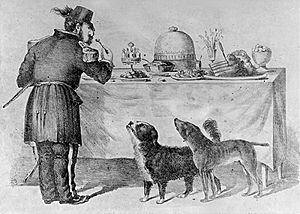 | |
| Description | Psychological theory about the ideology of animal use |
|---|---|
| Term coined by | Melanie Joy, 2001 |
| Related ideas | Anthrozoology, ethics of eating meat, psychology of eating meat, speciesism, veganism, vegetarianism |
| Part of a series on |
| Animal rights |
|---|
Carnism is a concept used in discussions of humanity's relation to other animals, defined as a prevailing ideology in which people support the use and consumption of animal products, especially meat.[n 1] Carnism is presented as a dominant belief system supported by a variety of defense mechanisms and mostly unchallenged assumptions.[1][2][3][4] The term carnism was coined by social psychologist and author Melanie Joy in 2001 and popularized by her book Why We Love Dogs, Eat Pigs, and Wear Cows (2009).[5][6][7]
Central to the ideology is the acceptance of meat-eating as "natural", "normal", "necessary", and (sometimes) "nice", known as the "Four Ns".[n 2] An important feature of carnism is the classification of only particular species of animal as food, and the acceptance of practices toward those animals that would be rejected as unacceptable cruelty if applied to other species. This classification is culturally relative, so that, for example, dogs are eaten by some people in Korea but may be pets in the West, while cows are eaten in the West but protected in much of India.[1]
- ^ a b c Cite error: The named reference
Gibert2014was invoked but never defined (see the help page). - ^ DeMello, Margo (2012). Animals and Society: An Introduction to Human-Animal Studies. New York: Columbia University Press. p. 138.
- ^ Dhont, Kristof; Hodson, Gordon (2014). "Why do right-wing adherents engage in more animal exploitation and meat consumption?", Personality and Individual Differences, 64, July (pp. 12–17), p. 4. doi:10.1016/j.paid.2014.02.002
- ^ Kool, V. K.; Agrawal, Rita (2009). "The Psychology of Nonkilling", in Joám Evans Pim (ed.),Toward a Nonkilling Paradigm, Center for Global Nonkilling, pp. 353–356.
- ^ Joy, Melanie (2011) [2009]. Why We Love Dogs, Eat Pigs, and Wear Cows: An Introduction to Carnism. Conari Press, p. 9. ISBN 1573245054.
- ^ Rose, Marla (8 November 2010). "An Interview with Dr. Melanie Joy", Encyclopædia Britannica Advocacy for Animals.
- ^ Schott, Ben (11 January 2010). "Carnism", Schott's Vocab, The New York Times.
- ^ Joy 2011, p. 96.
- ^ Cite error: The named reference
Piazza2015was invoked but never defined (see the help page). - ^ Singal, Jesse (4 June 2015). "The 4 Ways People Rationalize Eating Meat", New York Magazine.
Cite error: There are <ref group=n> tags on this page, but the references will not show without a {{reflist|group=n}} template (see the help page).